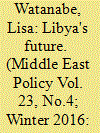| Srl | Item |
| 1 |
ID:
154318


|
|
|
| 2 |
ID:
149123


|
|
|
|
|
| Summary/Abstract |
The signing of the UN-brokered Libyan Political Agreement (LPA) in December 2015 and the subsequent establishment in March 2016 of a Government of National Accord (GNA), led by technocrat Fayez al-Sarraj, have raised hopes. Perhaps a two-year conflict that has divided the country between two rival parliaments and governments, each allied with armed actors, will finally be brought to an end and Libya's stalled transition resumed. Thus far, post-Qadhafi Libya has been plagued by the predominance of local interests linked to cities, regions and tribes that have thwarted the creation of a national polity. In principle, the LPA should mean that there is now agreement on new central-governance structures. However, this is far from being the case. The new unity government does not have broad-based support within the country and is increasingly vulnerable to challenges to its legitimacy. This does not bode well, given that the state lacks a monopoly on the use of force, with brigades and renegade units of the army operating autonomously.
|
|
|
|
|
|
|
|
|
|
|
|
|
|
|
|
| 3 |
ID:
156853


|
|
|
|
|
| Summary/Abstract |
To this day, Tunisia remains the only country in the MENA region that has undergone a democratic transition following the popular uprisings of 2010–11. Yet the transition has proven difficult. The young democracy remains plagued by a number of challenges, some of which stem from the legacy of the Ben Ali era and others that have emerged during the transition. Against this backdrop, the country has been confronted with the resurgence of Salafi currents, as well as with the phenomenon of jihadist radicalization. Today, Tunisia is, per capita and in absolute numbers, one of the biggest exporters of jihadist foreign fighters in the world. Fatalities in Tunisia from jihadist violence have skyrocketed since the uprising, with attacks in 2015 on the Bardo Museum in Tunis and on a resort in Sousse having captured international attention. These trends not only pose a threat to the stability of the country, they also fuel and prolong conflicts in the wider region, ultimately also posing a threat to Europe and the wider West.
|
|
|
|
|
|
|
|
|
|
|
|
|
|
|
|